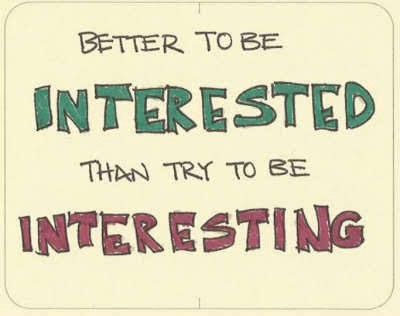How does an introvert network successfully with regards to career?
I used to think being introverted meant that I was just naturally 'bad' with people. It took me years to learn otherwise.
This is part 5 of 5 of a series called, “People and Career”.
In case you missed it, here’s part 1, 2, 3, and 4.
"Introvert" and "successful" in the context of networking aren't necessarily correlated.
But first, let's talk about what "successful" means.
If by "successful" you mean how comfortable you feel or how much you talk in a networking situation, then yes, extroverts tend to be more naturally successful in networking.
If by "successful" you mean how effective you are at building trust, rapport, instilling confidence, or getting someone to like you as a person, I'd argue that neither extrovert or introvert is naturally better because that is a skill that most people have to learn.
There's a reason why Dale Carnegie's book is called How to Win Friends and Influence People, not How Extroverts Can Win Friends and Influence People or vice versa. The principles he shares are applicable to anyone who wants to learn to be good with people.
When it comes to the latter definition of successful networking, it really comes down to one focus.
Adding Value
If someone took the time to get to know my interests, my passions, had a genuine curiosity about my goals or projects I'm working on, and then made an effort to help me towards those goals, I guarantee you, they will stand out in my mind.
I'm not a social psychologist, but it's not a far stretch to flip the concept and believe that if I take time to ask others about their interests, passions, goals, and projects and helped them forward in a meaningful way, it's likely that I'd stand out in their mind as well.
You see, most people approach networking with the intent to extract as much value from others as possible. It seems counterintuitive, but I'd like to propose that the person who gives value actually stands to gain more in the long run.
To illustrate in more concrete terms, most people approach networking with the goal of getting others to "pay" them $100. But what if you made your goal to give everyone you met $100?
Think about it, would you rather be known as the person who is always asking/expecting to get something or the person who is known for giving?
This is why my entire philosophy on networking is all about giving, investing in, and adding value to those around me. By doing this, I essentially brand myself as the guy who walks around giving $100 to everyone. This is powerful.
The surprising thing is, though, how few people actually do this.
In the past 5 years, I've probably met 300+ people in a networking context and I can only count on one hand the number of people who, in their first interaction with me, took the time to understand my interests, goals, or tried to help me in a meaningful way.
The bottomline is 99% of people are more concerned about themselves than they are about others. Everyone is thinking "What's in it for me?" so if you want to stand out like a sore thumb in the best possible way, just do the exact opposite and focus on giving instead of taking.
If you want some more examples of what "adding value" could look like, check out this answer: How do I grow and strengthen my network?
How to Add Value as a Newbie
The reality is, most people who are just learning how to network don't have worthwhile introductions to make, valuable insight to share, or resources to spare, so some of you may be thinking, "Well, what if I don't have the knowledge, resources, or network to help them? What if I have nothing to offer? How do I add value then?"
Here's the thing, people like to talk about themselves and their great ideas but there are few listening ears (I'm no exception). Most also like to be recognized and acknowledged for their accomplishments (aka brag), but it's taboo in most settings.
So a simple but effective way to add value is to simply be a sponge, be curious about the person's successes, or ask for their opinion/advice. Asking for their 2 cents is a win-win because it'll usually make them feel important and recognized for their expertise, all while you benefiting from their wisdom.
Here's a quick story from my own experience:
I was at a dinner a two months ago with a couple other businessmen who were friends of my mentor. None of us were really talking; we were just eating and it seemed like they were waiting for something interesting to happen. I had met them before, but never really had the chance to interact with and get to know them, so I decided to ask one of the guys about what they do.
Turns out, this guy runs a staffing company. They have huge pools of contractors who are readily available to conduct repairs/retrofits for big commercial buildings. They started 2-3 years ago by acquiring a failing firm, injecting cash, taking over the management and turned the company around. They currently burn through $200,000/month on payroll to keep the company running.
I spent a good 30 minutes asking about their strategy, some of the nitty gritty details on how they scaled up, the numbers behind their operations, the margins they were working on, the integral players on their team, and their exit strategy among other things.
The point is, by the end of the conversation, the guy complemented me in front of the table and said, "This guy gets it, he gets the numbers as good as I do. He gets it better than anyone else I've ever talked to about this because no one has ever asked me those questions. He asked all the right questions."
I hardly even spoke, I didn't talk about myself, I was clearly the novice in this interaction, it's unlikely there was anyone I would have been able to introduce him to who would be of value to him that he didn't already know,
and I didn't have any advice to give, yet, by the end of the conversation, I stood out more in his mind than countless others that had gone before me.
Again, learning to add value in conversation is a skill that you can get better at regardless of whether you're an introvert or extrovert.
If you nail this "adding value" aspect, you will eventually have people interject in the middle of the conversation and ask, "Enough about me, what about you?"
Now, a few tips to address the "introvert" part.
The goal isn't to mimic what more "outgoing" and extroverted people do. You don't have to be the center of attention, crack jokes left and right, be overwhelmingly expressive, try to talk to everyone in the room, or have the most to talk about.
As seen in the story I shared, all I did was ask curious questions. I didn't try to engage the entire table, I kept it as a one-on-one interaction. The point is, you can create the interaction you are most comfortable with.
Focus on quality, not quantity. The goal is not to get the most business cards. In a 3 hour event, I'll probably talk to, at most, 10 people. Because my goal is to be curious and add value, I frequently talk to the same person for 30+ minutes depending on how open they are to chat.
For me, there is a high correlation between 60+ minute conversations and people who become a bigger part of my life beyond the networking event -- these are the relationships I hope to nurture long term.
Attend private/niche events, not public/general events. Most of the events I go to are not public events. Many of them are events I am personally invited to, or are part of a special interest online community -- these interactions are much higher in quality.
Develop and pursue your interests. Define and live by values that are important to you. Doing these two things will give you clarity as to the kind of communities it'd be best for you to become a part of.
Give yourself permission to take breaks. Sometimes I'm out at an event where I'm meeting people for 5 hours straight and halfway through, I'll just sit by myself or stand to the side and just be o-k with not talking to anyone because I'm drained after a couple hours of conversation.
Plan for the post-game. If you are an introvert, you are drained by social interaction. Often, I need an extra hour of sleep or block out a few hours of alone time to recharge the next day so I plan my commitments accordingly.
Networking is not rocket science.
Networking does not have to be sleazy.
Networking can be enjoyable.
Networking correctly can open doors you've never imagined.
Networking can be mutually beneficial.
But I think the best benefit is that networking can lead to lifelong friendships.
Happy networking!
If you liked this, here are some of my other answers about social skills and networking:
This answer was originally published on Quora and had over 5,100 views.
I have 500+ answers on Quora and will be curating, IMO, the best answers I’ve written here for your convenience. All my Quora reposts will have this section for transparency and context, original content will not have this section.
After 10+ years of blogging all over the internets, I’m currently working on a book! If you resonate with my writing, you can sign up to get my book updates here.
When’s the next post coming out? I publish weekly on Sundays at 12pm Pacific (3pm Eastern, 3am Singapore, 8pm UK)




